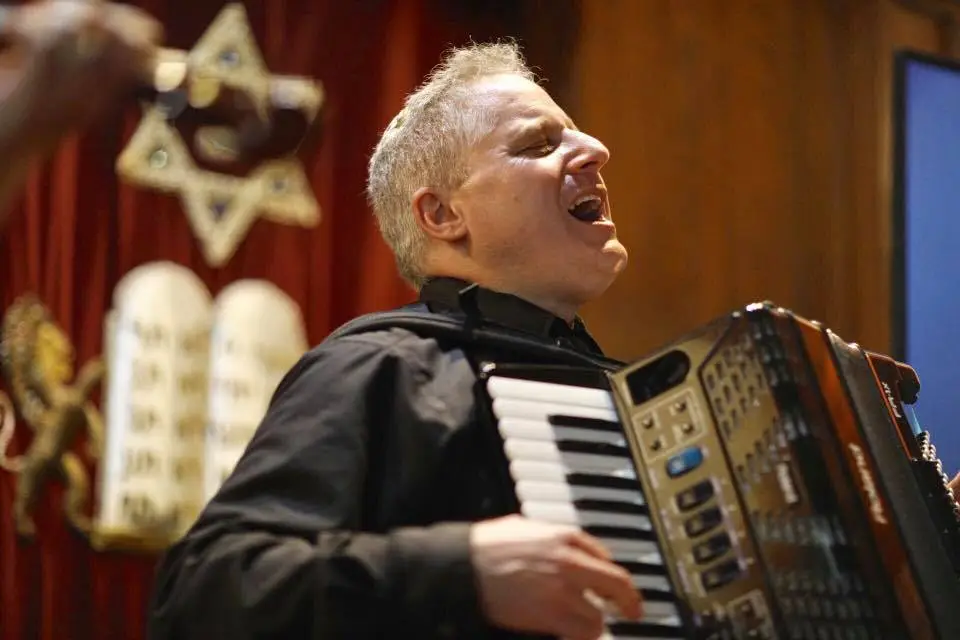
Date
Time
Pacific TimeLocation
Hasidic Music for Singers and Instrumentalists, with Sruli Dresdner
We warmly invite you to participate in Hasidic Music for Singers and Instrumentalists, with Sruli Dresdner.
For Singers: The deeply spiritual nature of the Hasidic nign (melody) is primarily sourced in intensity– an intensity that mirrors the intensity of Hasidic life. This workshop will immerse the participant in the power and energy of the Hasidic nign–sometimes slow/contemplative, other times energetic/frenzied. We will examine some of the underlying texts and discuss the aspects of the Hasidic lifestyle that contribute to the uniqueness of the nign as well as to its performance. Additionally, participants will learn Hasidic song treasures from Sruli’s extensive repertoire.
For Instrumentalists: The secret to understanding and performing Hasidic music is knowing that every Hasidic melody is a nign–a sung instrumental! In the Hasidic world, there is really no distinction between a sung melody and one that is played on an instrument. Every melody is both sung and played–sung in an instrumental style and played in a vocal style. Every Hosid, including of course, those who play instruments, is a singer of nigunim. A Hasidic clarinetist or violinist plays the same melodies that he has sung all his life.
The event begins at 11am Pacific Time (2pm Eastern, 7pm London, 8pm Paris, 9pm Tel Aviv).
About Sruli Dresdner» Sruli Dresdner has been performing and teaching klezmer and Hasidic music for the past twenty years. He grew up in a Hasidic household filled with nign. Sruli, together with his wife, Lisa, have appeared on PBS-TV, performed on National Public Radio, and headlined at Jewish festivals from Cracow to Jerusalem, Toronto to Texas. Sruli is extensively quoted as a primary source of Hasidic Music and philosophy in the Journal of the Society of Ethnomusicology (Spring/Summer 2007) and he is profiled as a contemporary Jewish educator for the Wexner Oral History Project at the National Yiddish Book Center. Sruli and Lisa have performed at theaters, JCC’s, synagogues, universities and schools as well as at hundreds of Bar/Bat Mitzvahs and weddings. Sruli is currently the Rabbi of Temple Shalom in Auburn, Maine.
To reserve a space, scroll down to BOOK EVENT, click on NEXT, and complete the registration form. Registration ends four hours before the workshop begins, i.e. 7am Pacific Time (10am Eastern, 3pm London, 4pm Paris, 5pm Tel Aviv) the day of the event. After then, write workshops@klezcalifornia.org; we cannot promise to notice your email if you contact us after the deadline.
Registering for this event includes giving KlezCalifornia permission to take still and video images and use them for educational or other organizational purposes. If you do not agree to such use, please turn off your video when you join the event. To keep you informed of future events, we enroll registrants in our free monthly newsletter, which includes klezmer and Yiddish culture events in the San Francisco Bay Area and online. You may unsubscribe at any time. KlezCalifornia does not share its lists with other organizations.
Those who have registered by the deadline will receive sign-in by 8:10am Pacific Time that day. If you have not heard by then, write a.s.a.p. to workshops@klezcalifornia.org. Please do not wait until just before the event begins to notice whether you have the sign-in info.
KlezCalifornia relies on donations from participants to cover the costs of online lectures, workshops, kumzitsn, play readings, and more. Donations of $25 (or whatever you can afford) are greatly appreciated to enable us to continue to connect you with Yiddish culture and to assist presenters, many of whom have lost most of their income because of the pandemic.
This project has been made possible in part by a grant from the Alliance for California Traditional Arts, in partnership with the Walter & Elise Haas Fund, the William and Flora Hewlett Foundation, Grants for the Arts, and The California Endowment.
